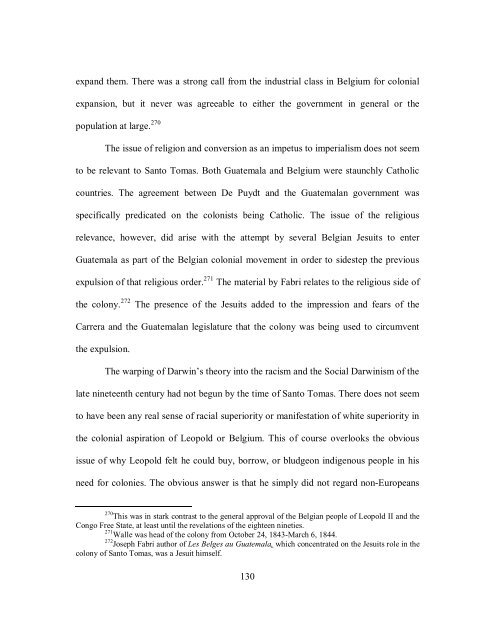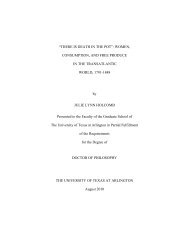EARLY BELGIAN COLONIAL EFFORTS - The University of Texas at ...
EARLY BELGIAN COLONIAL EFFORTS - The University of Texas at ...
EARLY BELGIAN COLONIAL EFFORTS - The University of Texas at ...
You also want an ePaper? Increase the reach of your titles
YUMPU automatically turns print PDFs into web optimized ePapers that Google loves.
expand them. <strong>The</strong>re was a strong call from the industrial class in Belgium for colonial<br />
expansion, but it never was agreeable to either the government in general or the<br />
popul<strong>at</strong>ion <strong>at</strong> large. 270<br />
<strong>The</strong> issue <strong>of</strong> religion and conversion as an impetus to imperialism does not seem<br />
to be relevant to Santo Tomas. Both Gu<strong>at</strong>emala and Belgium were staunchly C<strong>at</strong>holic<br />
countries. <strong>The</strong> agreement between De Puydt and the Gu<strong>at</strong>emalan government was<br />
specifically predic<strong>at</strong>ed on the colonists being C<strong>at</strong>holic. <strong>The</strong> issue <strong>of</strong> the religious<br />
relevance, however, did arise with the <strong>at</strong>tempt by several Belgian Jesuits to enter<br />
Gu<strong>at</strong>emala as part <strong>of</strong> the Belgian colonial movement in order to sidestep the previous<br />
expulsion <strong>of</strong> th<strong>at</strong> religious order. 271 <strong>The</strong> m<strong>at</strong>erial by Fabri rel<strong>at</strong>es to the religious side <strong>of</strong><br />
the colony. 272 <strong>The</strong> presence <strong>of</strong> the Jesuits added to the impression and fears <strong>of</strong> the<br />
Carrera and the Gu<strong>at</strong>emalan legisl<strong>at</strong>ure th<strong>at</strong> the colony was being used to circumvent<br />
the expulsion.<br />
<strong>The</strong> warping <strong>of</strong> Darwin’s theory into the racism and the Social Darwinism <strong>of</strong> the<br />
l<strong>at</strong>e nineteenth century had not begun by the time <strong>of</strong> Santo Tomas. <strong>The</strong>re does not seem<br />
to have been any real sense <strong>of</strong> racial superiority or manifest<strong>at</strong>ion <strong>of</strong> white superiority in<br />
the colonial aspir<strong>at</strong>ion <strong>of</strong> Leopold or Belgium. This <strong>of</strong> course overlooks the obvious<br />
issue <strong>of</strong> why Leopold felt he could buy, borrow, or bludgeon indigenous people in his<br />
need for colonies. <strong>The</strong> obvious answer is th<strong>at</strong> he simply did not regard non-Europeans<br />
270 This was in stark contrast to the general approval <strong>of</strong> the Belgian people <strong>of</strong> Leopold II and the<br />
Congo Free St<strong>at</strong>e, <strong>at</strong> least until the revel<strong>at</strong>ions <strong>of</strong> the eighteen nineties.<br />
271 Walle was head <strong>of</strong> the colony from October 24, 1843-March 6, 1844.<br />
272 Joseph Fabri author <strong>of</strong> Les Belges au Gu<strong>at</strong>emala, which concentr<strong>at</strong>ed on the Jesuits role in the<br />
colony <strong>of</strong> Santo Tomas, was a Jesuit himself.<br />
130
















